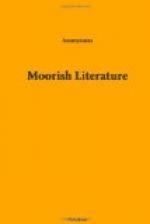Can build within thy bosom her castle high and strong,
And put a jailer at thy lips, to lock thy recreant tongue.
Yet hast thou gifts that ladies love; thy bearing bold and bright
Can break through every obstacle that bars them from delight.
And with such gifts, friend Zaide, thou spreadest thy banquet board,
And bidst them eat the dish so sweet, and never say a word!
But that which thou hast done to me, Zaide, shall cost thee dear;
And happy would thy lot have been hadst thou no change to fear.
Happy if when thy snare availed to make the prize thine own,
Thou hadst secured the golden cage before the bird was flown.
For scarce thy hurrying footsteps from Tarfe’s garden came,
Ere thou boastedst of thine hour of bliss, and of my lot of shame.
They tell me that the lock of hair I gave thee on that night,
Thou drewest from thy bosom, in all the people’s sight,
And gav’st it to a base-born Moor, who took the tresses curled,
And tied them in thy turban, before the laughing world.
I ask not that thou wilt return nor yet the relic keep,
But I tell thee, while thou wearest it, my shame is dire and deep:
They say that thou hast challenged him, and swearest he shall rue
For all the truths he spake of thee—would God they were not true!
Who but can laugh to hear thee blame the whispers that reveal
Thy secret, though thy secret thyself couldst not conceal.
No words of thine can clear thy guilt nor pardon win from me,
For the last time my words, my glance, have been addressed to thee.”
Thus to the lofty warrior of Abencerraje’s race
The lady spoke in anger, and turned away her face:
“’Tis right,” she said, “the Moor whose tongue has proved to me unkind
Should in the sentence of my tongue fit retribution find.”
ZAIDA’S INCONSTANCY
O fairest Zaida, thou whose face brings
rapture to mine eyes!
O fairest Zaida, in whose smile my soul’s
existence lies!
Fairest of Moorish maidens, yet in revengeful
mood,
Above all Moorish maidens, stained by
black ingratitude.
’Tis of thy golden locks that love
has many a noose entwined,
And souls of free men at thy sight full
oft are stricken blind;
Yet tell me, proud one, tell me, what
pleasure canst thou gain
From showing to the world a heart so fickle
and so vain?
And, since my adoration thou canst not
fail to know,
How is it that thy tender heart can treat
thy lover so?
And art thou not content my fondest hopes
to take away,
But thou must all my hope, my life, destroy,
in utter ruin lay?
My faithful love, sweet enemy! how ill
dost thou requite!
And givest in exchange for it but coldness
and despite;
Thy promises, thy pledge of love, thou




